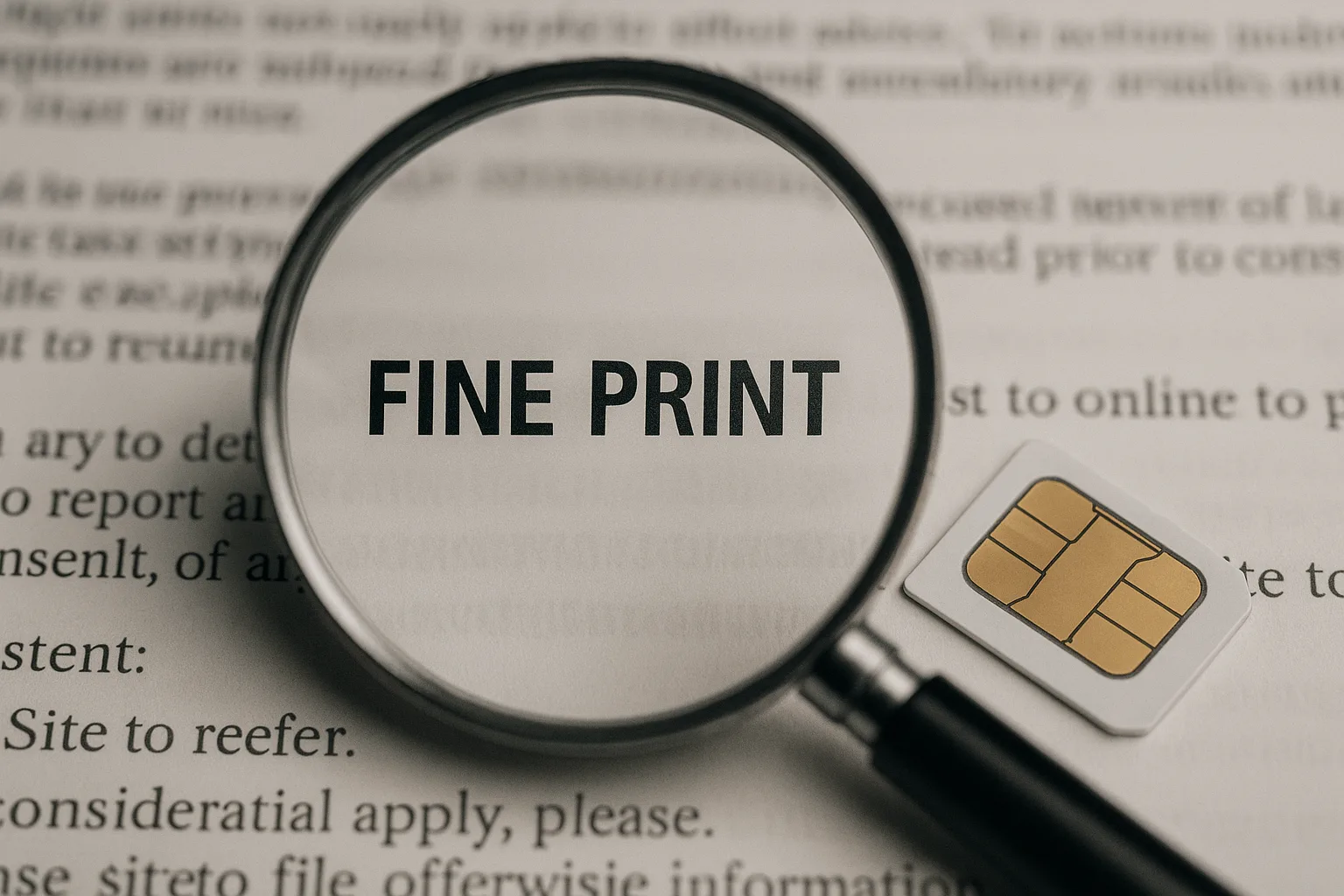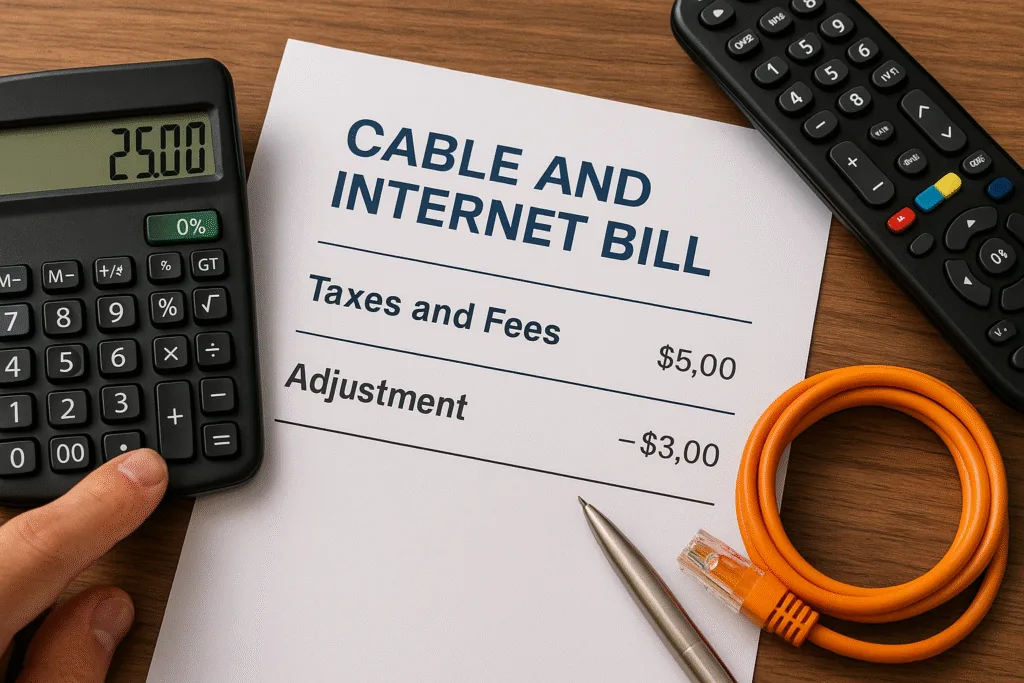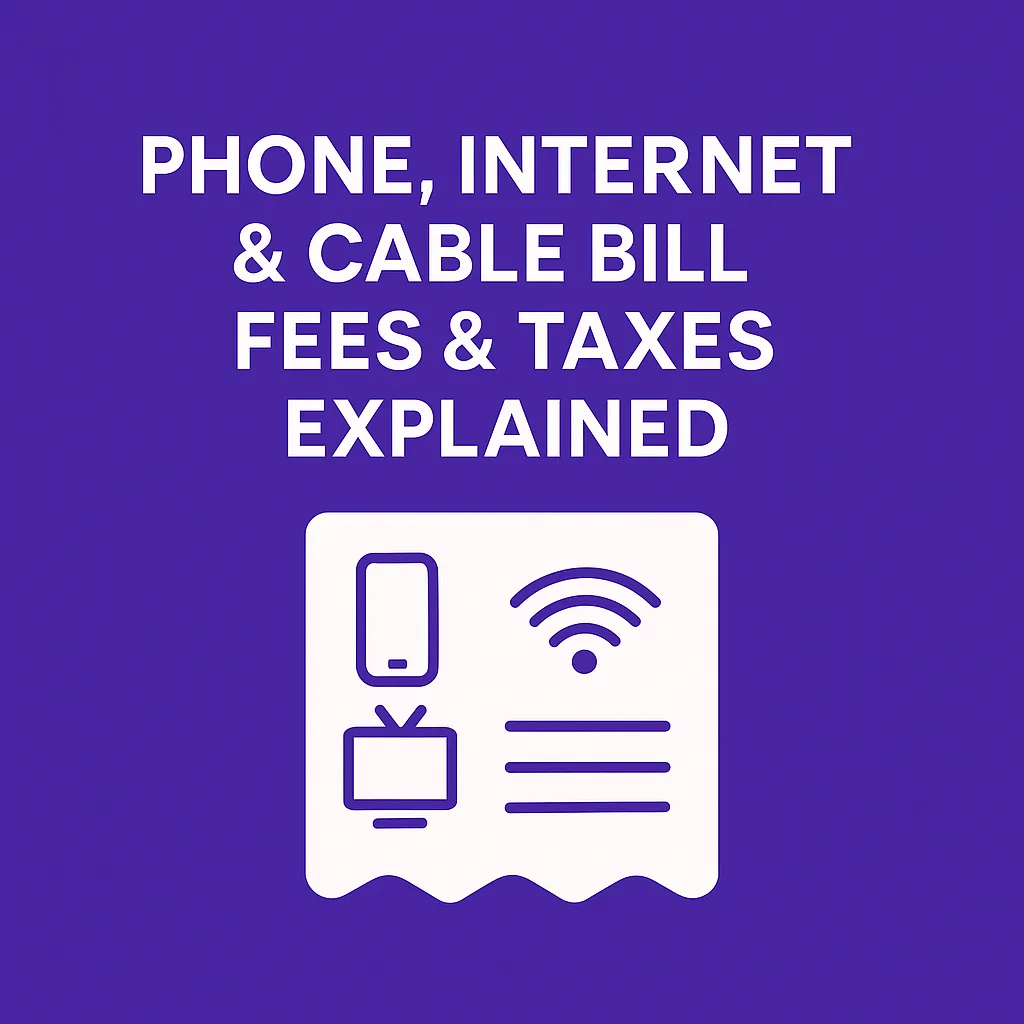Strange Taxes and Fees on Bills: Which Ones Are Actually Required by Law?
When you open up your cell phone, cable, or utility bill, do you feel like you need a decoder ring to figure out the extra charges? From “universal connectivity” fees to “broadcast TV” surcharges, these bills often include strange taxes and fees that leave us scratching our heads. The truth is, some line items are legitimate taxes or government-required charges, but many others are simply “junk fees” added by providers. In this guide, we’ll shine a light on those mysterious charges and help you understand which ones you’re stuck with and which you might be able to challenge or cut.
I still remember the day I noticed a “Regulatory Cost Recovery Fee” on my wireless bill and half-jokingly wondered if I was being taxed for the air I breathe. After a quick call to customer service (and a bit of personal embarrassment), I learned that fee wasn’t a government tax at all. It was a surcharge my carrier chose to add. That little revelation was a wake-up call. If you’ve ever felt the same confusion or suspicion about your bills, you’re not alone. Let’s dive into my lessons learned so you can save money and avoid paying one cent more than you have to.

Government Taxes vs. Company Surcharges: Know the Difference
The first step to saving on strange bill charges is knowing which fees are actually mandated by law and which are not. Here’s the rule of thumb I wish I’d known sooner: if a fee’s name sounds vague or “official-sounding” but doesn’t clearly say tax or government in it, it’s likely not a tax; it’s something your provider tacked on. For example, a “911 Emergency Service Fee” on a phone bill is typically required by law and passed through to fund local 911 dispatch centers. In contrast, a “Regulatory Recovery Fee” or “Administration Fee” is not a tax or government-imposed charge at all. These are company surcharges set by the carrier to recoup their costs of doing business. In fact, carriers like T-Mobile or AT&T openly admit these fees help cover things like compliance costs, cell tower maintenance, or even the expense of number portability. They sound mandatory, but they aren’t set by any government agency. The takeaway: required taxes and fees are collected on behalf of government, while anything else is usually the company charging you extra under a confusing label. And those company-added “junk” fees can really add up over time, often with little explanation on your bill.

Weird Charges Hiding on Your Phone Bill
Phone bills are notorious for their alphabet soup of surcharges. Let’s decode a few common ones: “Universal Service Fund” (USF) Fee. This charge funds a federal program to expand phone or internet access. Carriers must contribute to the USF by law, but they aren’t required to make you pay for it. Many big wireless providers choose to pass this cost to customers, whereas some smaller prepaid carriers include it in their prices. All told, wireless customers pay around $5 billion annually in these USF surcharges, so it’s a significant hidden cost nationwide. Then there are the explicit taxes. For instance, state and local telecom sales taxes or 911 fees are mandated. These vary a lot by location. If you live in a high-tax state like New York, you might see over 24% of your wireless bill going to government taxes and fees alone. Those taxes are essentially non-negotiable.
Now compare those to the “Regulatory” or “Administrative” fees on your bill. These have official-sounding names but no government is telling the carrier to charge them. Despite the name, regulatory charges are not government-mandated at all. They’re imposed by the company, effectively part of the price of service, just not included in the advertised rate. An example: Verizon’s monthly “Administrative & Telco Recovery Charge” isn’t a tax; it’s Verizon’s way of billing you for things like network maintenance or inter-carrier fees. Every major carrier has a variant of these (T-Mobile’s “Regulatory Programs Fee,” AT&T’s admin fee, and so on) and they can change or increase at the carrier’s discretion. The good news? Because these aren’t official taxes, you can sometimes fight them. If your regulatory or admin fee suddenly jumped one month, consider calling your provider to ask for a credit or a better plan. I’ve had success negotiating a small discount after pointing out that I noticed a fee hike. It never hurts to ask. At the very least, being aware that these charges are not required by law gives you confidence to question them. And if your carrier won’t budge, you might save by switching to a more transparent provider. Some smaller carriers advertise “no hidden fees” or include all fees in their listed price.

Strange Fees on Cable and Internet Bills
Cable TV and internet bills often take the “mystery fee” game to the next level. You’ve probably seen charges like “Broadcast TV Fee” or “Regional Sports Network Fee” each month. Here’s the scoop: none of those are government-required taxes. They are created by cable companies to recover their own costs. In fact, one major cable provider (Xfinity) openly states that its Regional Sports and Broadcast TV fees “aren’t government-mandated” at all. They’re simply passing on the expense of content licensing to you. Essentially, you’re paying the cable company extra so they can carry your local ABC, NBC, CBS stations and regional sports channels, even though you signed up for a TV package expecting those channels to be included. It feels like a sneaky bait and switch, right? You’re not alone in feeling that way. A recent consumer study found that about 24% of the typical cable bill, roughly $450 per year, comes from company-imposed fees. In other words, those “surprise” fees can be a quarter of your bill. No wonder your cable bill always seems higher than the promotional price you thought you’d get.
What about truly mandatory fees on cable bills? The main one is usually the “Franchise Fee.” This is a charge, often around 5% of the bill, that local governments require cable companies to collect as rent for using public rights of way. A franchise fee is established by law or local ordinance, so yes, it’s legit. Your provider passes it through to the city or county. You might also see a “PEG fee” that supports Public, Educational, Government access channels, which is another local requirement in some areas. These are usually small, cents or a dollar or two, and are indeed mandated. Aside from those, most other weirdly named cable charges are fair game for scrutiny. Equipment rental fees for cable boxes or modems are not taxes. They’re avoidable if you buy your own equipment. Installation or activation fees are just one-time company charges. Sometimes you can negotiate them down or get promo credits. And don’t forget late payment fees or “convenience fees” for paying by phone. Those are junk fees you should aim to dodge by paying on time and online, or by using a provider that doesn’t charge them. One more tip: always read the fine print of any cable or internet promo. Providers often advertise a low promo rate “plus taxes and fees,” which means that awesome $80 per month deal might really be $105 once they add the broadcast fee, sports fee, modem fee, and more. Going forward, the government is pushing for all-in pricing. The FCC has even adopted rules to make cable and satellite TV disclose the full price upfront. Until that fully takes effect, it’s on us to ask, “So, what will my bill really be each month, including all fees?” Don’t be shy. Get the number in writing before you sign up or renew. It can save you from fee shock later.
Oddball Surcharges on Utility Bills (Electric, Gas, Water)
Utility bills may not have as many line items as a phone or cable bill, but they still can include puzzling fees and surcharges beyond the basic cost of electricity, gas, or water usage. Ever notice charges like “Energy Cost Adjustment,” “Transmission Rider,” “Environmental Surcharge,” or even fees to subsidize specific projects? These usually stem from state utility regulations. In many states, utility companies are allowed, or directed, by regulators to add riders for things like infrastructure upgrades, renewable energy programs, or fuel price fluctuations. For example, a utility might invest in strengthening the grid or building a new solar farm and recover those costs via a small per kWh surcharge on your electric bill. Each individual charge might be tiny, a fraction of a cent per unit, but they can add $30-$40 over a year. Utilities often have a dozen or more such riders in places like New Jersey. The key here is that most utility surcharges are indeed required or approved by law, through your state public utility commission. Unlike cable or phone, your power company isn’t tacking on random fees at its sole discretion; they have to justify these charges to regulators. Still, from a customer perspective, it can feel frustrating to pay an “Efficiency Program Charge” or “Nuclear Decommissioning Fee” when it wasn’t clearly explained when you signed up for service.
So what can you do about utility fees? First, focus on what you can control: usage. Many utility surcharges are proportional to how much energy or water you use. Lower usage means lower surcharges and taxes. Also, check if your area offers budget billing or bill assistance programs. While those won’t remove fees, they can stabilize your payments. If you see a suspicious or unfamiliar fee on a utility bill, say a suddenly introduced charge, don’t hesitate to call your utility’s customer service and ask for an explanation. Occasionally, billing mistakes happen or a fee might be temporary. Catching it could save you money. Unlike cable or phone, you usually can’t shop around easily for a different electric company unless you live in a state with energy choice, but you can attend public utility commission meetings or comment when they propose new fees. It might feel like shouting into the void, but public pressure has stopped some unnecessary utility charges in the past. At the very least, being informed about where each dollar is going on your electric or water bill will help you budget better and avoid surprises.
How to Fight Back and Save on Hidden Fees
You don’t have to just accept every line on your bill as fate. A little savvy can go a long way in cutting down those junk fees. Here’s a quick game plan you can try today:
- Audit Your Bills: Take 10 minutes to go through your latest phone, cable, or utility bill with a highlighter. Identify each charge you don’t understand. Is it labeled as a tax or government fee? If not, mark it for questioning. Sometimes just seeing all the “extras” totaled up is motivation to take action.
- Ask Your Provider for Clarity (and Discounts): Call or chat with customer service and literally ask, “Which of these fees on my bill are required by law, and which are your company’s fees?” This puts them on the spot to be honest. Once they clarify, politely push back on the company-imposed fees. For instance, if you notice a “network enhancement fee” that isn’t mandated, say you’re not happy about it, especially if it recently increased. You might get a courtesy credit or find out about a promotion that offsets it. At minimum, you’ll make it known that consumers are paying attention.
- Remove What You Don’t Need: Some fees are avoidable by adjusting your services. Paying $10 per month to rent a cable modem or router? Invest in your own compatible device and return the rental. You’ll eliminate that fee entirely. Getting charged for a premium channel package or phone line you barely use? Dropping those extras can cut several fees and taxes at once. Since many taxes are percentage-based, a lower base service cost means lower taxes too. One reader saved nearly $20 a month in fees alone by cutting a legacy landline off their cable bundle that they didn’t truly need, which reduced the bill’s surcharges and taxes across the board.
- Consider Competitive Alternatives: If your current provider is drowning you in fees, it may be time to shop around. For example, many MVNO cell providers offer plans with taxes and fees included in the advertised price. What you see is what you pay. Going from a big carrier to a smaller one could mean a slightly lower bill and fewer mystery surcharges. Similarly, if cable TV fees are too much, look into streaming services or antennas for local channels. There is no broadcast TV fee on those. Just watch out for trade-offs. Streaming services have their own taxes and price increases, so do the math before you cut the cord purely to save on fees.
- Stay Alert to New “Junk” Fees: Unfortunately, companies are always finding creative new fees. Some wireless providers tried adding “economic adjustment fees” in recent years. Keep an eye on news about billing changes. The good news is regulators are cracking down on deceptive fees, and the FCC and FTC have started calling out unfair charges and pushing for transparency. Until all our bills are crystal clear, your best defense is being an informed consumer who isn’t afraid to question a line item.
Bottom line: understanding your bills can feel empowering. Once you separate the real taxes from the junk, you’ll know where you have leverage to save. No one enjoys paying bills, but there’s a certain satisfaction in spotting a bogus fee and saying, “Nope, I’m not falling for that one.” With a bit of effort, you can keep more of your hard-earned money in your pocket and send less of it toward those strange fees that aren’t truly required by law.
Related Posts:
- Best Budgeting App for 2026: Unlock Financial Freedom Today
- Join Buy Nothing Groups to Save Thousands on Free Stuff
- Your Guide to the 2025 Tax Changes: What the New Law Means for You
- 5 Fun Money Saving Challenges to Boost Your Savings
- The Ultimate Guide to Cancel Unwanted Subscriptions & Save $1600+
External Resources
- Forbes: “What Are All Those Hidden Fees on Your Cell Phone Bill?” — An explanation of common wireless bill fees and which ones you can avoid. (Forbes Finance Council)
- Ars Technica: Cable Companies Use Hidden Fees to Raise Prices (24% Increase) — News analysis of how cable TV bills include about $37 per month in company fees and about $13 in taxes, based on Consumer Reports’ study. Great for understanding the scope of cable “junk fees.”
- Xfinity (Comcast) Fee Explanations — Cable provider’s own support page clarifying that the Broadcast TV and Regional Sports fees are not government taxes but costs the company passes to consumers. Helps confirm what’s legit vs. not on a cable bill.
- ProPublica: “The Obscure Charges That Utility Companies Add to Your Bills” — Investigative piece on the myriad surcharges on utility bills like electricity and why they’re there. Illuminates how even regulated utilities tack on 10 plus “lurking” fees for various programs.
Disclaimer: SaveMeMonthly.com provides general money-saving info, not financial, legal, tax, insurance, or professional advice. Offers, rates, and terms change and vary by location. Always confirm details with the provider before you buy. We may earn a commission from some links at no extra cost to you. Trademarks belong to their owners. Your choices are your responsibility.


Leave a Reply